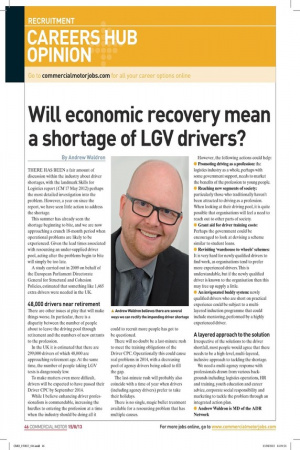RECRUITMENT CAREERS HUB OPI commercialmotorjobs.com for all your career options online Will economic recovery mean
Page 41

If you've noticed an error in this article please click here to report it so we can fix it.
a shortage of LGV drivers? by mnu, ew Welch on
THERE HAS BEEN a fair amount of discussion within the industry about driver shortages, with the landmark Skills for Logistics report (CM17 May 2012) perhaps the most detailed investigation into the problem. However, a year on since the report, we have seen little action to address the shortage.
This summer has already seen the shortage beginning to bite, and we are now approaching a crunch 18-month period when operational problems are likely to be experienced. Given the lead times associated with resourcing an under-supplied driver pool, acting after the problems begin to bite will simply be too late.
A study carried out in 2009 on behalf of the European Parliament Directorate General for Structural and Cohesion Policies, estimated that something like 1,465 extra drivers were needed in the UK. 48,000 drivers near retirement
There are other issues at play that will make things worse. In particular, there is a disparity between the number of people about to leave the driving pool through retirement and the numbers of new entrants to the profession.
In the UK it is estimated that there are 299,000 drivers of which 48,000 are approaching retirement age. At the same time, the number of people taking LGV tests is dangerously low.
To make matters even more difficult, drivers will be expected to have passed their Driver CPC by September 2014. While I believe enhancing driver professionalism is commendable, increasing the hurdles to entering the profession at a time when the industry should be doing all it A Andrew Waldron believes there are several ways we can rectify the impending driver shortage
could to recruit more people has got to be questioned.
There will no doubt be a last-minute rush to meet the training obligations of the Driver CPC. Operationally this could cause real problems in 2014, with a decreasing pool of agency drivers being asked to fill the gap.
The last-minute rush will probably also coincide with a time of year when drivers (including agency drivers) prefer to take their holidays.
There is no single, magic bullet treatment available for a resourcing problem that has multiple causes. However, the following actions could help:
• Promoting driving as a profession: the logistics industry as a whole, perhaps with some government support, needs to market the benefits of the profession to young people.
• Reaching new segments of society: particularly those who traditionally haven't been attracted to driving as a profession. When looking at their driving pool, it is quite possible that organisations will feel a need to reach out to other parts of society.
• Grant aid for driver training costs: Perhaps the government could be encouraged to look at devising a scheme similar to student loans.
• Revisiting 'warehouse to wheels' schemes: It is very hard for newly qualified drivers to find work, as organisations tend to prefer more experienced drivers. This is understandable, but if the newly qualified driver is known to the organisation then this may free up supply a little.
• An invigorated buddy system: newly qualified drivers who are short on practical experience could be subject to a multilayered induction programme that could include mentoring, performed by a highly experienced driver. A layered approach to the solution
Irrespective of the solutions to the driver shortfall, most people would agree that there needs to be a high-level, multi-layered, inclusive approach to tackling the shortage.
We need a multi-agency response with professionals drawn from various backgrounds including; logistics operations, HR and training, youth education and career advice, corporate social responsibility and marketing to tackle the problem through an integrated action plan. • Andrew Waldron is MD of the ADR Network











































